- Home
- Michael White
To the Lighthouse Page 2
To the Lighthouse Read online
Page 2
There was a loud click and the nightingale stopped shooting and dropped to the ground.
“How far is the nearest maintenance station?” I asked, sprinting onwards.
“Turn left next intersection.” said Auntie, “half a mile straight on.”
“Excellent.” I smiled.
“There may not be any ploughs housed there though.” she said, “The main computer systems are down so I have no way of knowing.”
“I think it’s the best shot we have though.” I said, running onwards.
“Awww.” said auntie, “You said, “We”. How cute.”
***
In the end it was nearer to a mile before we saw the first sign for the maintenance station, and by then there were another five deactivated nightingales behind us, and no doubt more on the way. There had only been one seriously close shave, and that was when one of the nightingales appeared but a few seconds after zapping another one of them. I had taken off like a hare from a trap to buy some time and I was lucky and I just about got away with it.
The maintenance station entrance was securely closed as it was a way out of the passenger discs, but auntie soon had it open and as we entered the station the door slid shut behind us, lights coming on in the snow plough bays as movement was detected by sensors concealed who knows where.
“You need to suit up.” said auntie, “No atmosphere once we leave the hangar bay. You will effectively be in space.”
I rummaged along lockers on the walls of what looked like the likeliest bay and found a suit the seemed to fit. As I attached the breather tank and saw it was full the helmet seal locked in place and the computer read out on the helmet tried to come online and then suddenly crashed. There was a small pause and then a small picture of auntie appeared in the corner of the visor and her voice chimed through the suit intercom.
“There.” she said calmly, “I thought a little picture would be nice.”
“It’s hardly necessary auntie.” I smiled, “The fewer distractions I have the better really.”
There came a loud tutting sound from the intercom but the picture remained.
“That is my best side.” she said, “Taken just after the annual pruning of my African Begonias I seem to recall.”
“Africa has begonias?” I asked, running through the usual security checks to assess suit pressurisation was steady and so on. These were things I did know about.
“They do now.” she sighed, “Or did. Before I was uploaded into this bloody bracelet.”
Having discovered that all suit systems were working perfectly fine I entered the airlock and followed the normal procedures, stepping out into the open hangar bays less than a minute later.
Gravity was definitely lighter here, and I stumbled once or twice as I attempted to customise myself to it. I looked along the hangars and saw two of the ice ploughs parked in two of the bays and so began to make my way towards the nearest. They were large vehicles, not unlike a snow plough you would find on Earth, but the shovels in front of them were larger and more curved, the body of the bulldozer narrower, needing less mechanical muscle in the decreased gravity.
I reached the first and climbed up the ladder on its outside and entered the cab. It was a rudimentary affair, steered by what was no more than a glorified joystick, though there were several ice encrusted panels all showing nothing at all before me.
“Is there an ignition key?” I asked and I heard a sound from the intercom that sounded suspiciously like auntie trying to contain a laugh.
“Red button.” she said, sarcasm in her voice, “far left.”
I scraped the ice off the console with my spacesuit gloved hand and pressed the red button that was now revealed. There was a deep rumble and the vehicle came to life, panels illuminating around me, all showing information that I had no way whatsoever of comprehending.
“There are pedals on the floor for acceleration and brakes.” said auntie, pausing as if she was speed reading the manual for the plough, which I suppose in a way was exactly what she was doing. “The joystick controls direction.”
“Okay.” I said, pushing one pedal and sending the plough crashing against the wall of the hangar.
“Easy, tiger.” said auntie Myrtle, “Watch out for the lighter gravity.”
I pushed the pedal again and slowly edged the plough away from the wall and out onto the field of frozen ammonia, the ice sparkling and shining ahead of me, causing the reflection filter on my helmet visor to compensate accordingly.
“North.” said auntie, and so I pressed slowly on the pedal and the plough began to head towards the main ship of the Austin 3, sliding across the ice at an increasing speed.
“Will the nightingales catch up?” I asked tentatively. I had not seen any since we had entered the maintenance station and wondered if they were lying ahead in wait.
“They only patrol the passenger disks.” said the AI, “Now we are no longer in the disk as far as they are concerned we do not exist.”
“Well that’s a relief.” I said. “None in the main ship either?”
“No. They are there purely to make sure no passengers wake early.”
“And if they do send them back to sleep.”
“Well initially anyway. You saw what happened if you resisted them. They were programmed to be a bit heavier handed if a passenger was stupid enough to cause a fuss.”
“Two hundred thousand sleeping passengers needs quite a bit of looking after.” I said, marveling at the view behind me of the frozen discs spinning high above the ice field and away into space as far as I could see.
“Just concentrate on getting us to the bridge.” said auntie, “if we can get the main computer back online I may be able to determine why the engines have shut down.”
“ETA?” I enquired.
“Twenty minutes or so. Just keep heading north and you will see another maintenance station. On the schematics of the Austin 3 it is the northernmost station for the ploughs and is adjacent to the main control console and therefore the bridge. Just keep going.”
“Will do.” I said enthusiastically.
“Good.” said auntie, “Well if it’s okay with you then I will get back to cross referencing my knitting patterns. Let me know when we are there.”
“Sure.” I said, and continued to drive the snow plough north.
***
The north maintenance station was in appearance and functionality identical to the one we had stolen the snow plough from, though as we left the vehicle behind and entered the airlock, I could not help but feel that it looked just a little bit more looked after; better maintained, its proximity to the bridge being no doubt responsible for it being tidier. Once the indicators on the suit showed it was safe to do so and I had moved through the airlock I removed the helmet and placed it carefully on the ground.
I breathed in the air and again it was the same smell; ammonia and static, but this time there was a vague hint of polish in the air too. I ran through the corridor and followed the signs to the bridge, auntie opening the door to the main control room of the Austin 3 as I did so. Again, motion sensors lit the room. For the main bridge of the ship it was slightly disappointing I felt. I had never been deemed important enough to be allowed this far but it was a medium sized room, a large circular window showing a planet below. Consoles were everywhere, but the only ones lit were a bank of computers showing nine banks of screens, each one monitoring the passenger cryogenic discs.
“They monitor the sleeping passengers.” said Auntie, “The main computer is not functioning at all. We need to turn it on.”
I looked at bank after bank of dead screens and felt panic rising in my throat.
“How auntie?” I gulped. I was not an engineer or computer technician. I had no idea where to start.
“Well I don’t think that the ship’s computer is actually turned off as such.” said auntie eventually, an edge of confusion in her voice. “I think that perhaps it may have actually crashed.”
“So w
hat do I do?” I asked, bewildered by all of the dead screens.
“Try turning it off and then on again.” she said, “disconnect that large power hose under the main console and then lock it back in place again.”
I did as I was told and kneeled under the largest screen in the room and pulled out the biggest cable. The room was plunged into darkness and I heard several of the screens make a noise like leaves rustling, as if they were being forced to close down. I counted to ten and then eased the cable back. It was easier said than done, for I was in the dark now and it was quite a heavy piece of kit, but eventually I managed and the lights instantly came back on, and as I stood I saw several of the screens coming back to life, their displays flickering, read outs showing. The predominant colour appeared to be red.
“Well done Kim.” said Auntie Myrtle proudly, but I did not have time to answer as the deck beneath my feet suddenly lurched downwards and I was thrown through the air across one of the panels and fell to the floor.
Klaxons began to sound all around the bridge, screens flashing.
“Engines offline.” said a disembodied voice through the speakers. It sounded eerily calm, given what it was actually informing us of. “Planetary collision in sixty-three minutes.”
“Ah.” said auntie. “I think it may be a good idea to restart the fusion drives or we’re all going to be splattered all over that planet below.”
“Which I take it isn’t Eridani-E then?”
“Definitely not.” said the AI from my wristband, “In fact I can’t see on any planetary maps that I can access. It shouldn’t actually be there at all.”
“Well someone forgot to tell it that.” I said. “Auntie can you access the main computer now?”
“I should think so.” she said, not entirely sure by the sound of it.
“Well can I suggest you restart the engines?” I said a little testily.
“I will interface with the main computer.” said Auntie. “Feel free to dust while you wait. It’s a little uncared for in here I think. Eighty years is a long time for nobody to have bothered with doing a spot of tidying up.”
“If it’s alright with you auntie I will leave the dusting for later. Just get the drives running.”
I expected a confirmation but nothing came. I wandered to the main window of the bridge and gazed at the blue and red planet below. Without computer assisted magnification or indeed any other controls it was almost useless. The ship itself seemed to be concentrating all of its efforts on alerting the crew to the fact that unless the engines were switched on very shortly then it was all over for all of us.
“Anything auntie?” I asked the wristband, examining it to see if there was anything on the small display. There wasn’t. “Auntie?” I repeated and still there was nothing. A minute passed. Then another. “Auntie!” I shouted this time, but still there was no reply.
Sighing I looked at the nearest console. It was just flashing an alert message in several different languages, but that was all.
“Oh dear.” said auntie suddenly and I startled as her voice was now coming out of the bridge speakers.
“You accessed the main computer then?” I said angrily, annoyed at having being shocked by the sudden loud noise,
“Yes.” said auntie dreamily.
“Then turn the engines back on.” I shouted.
“I think you need to look at this first.” said auntie, and the main view screen shifted away from the planet, magnifying as it did so.
As the screen shifted I felt my stomach lurch at the sudden rapid movement and then onto the view screen floated a spacecraft the like of which I had never seen before. It looked more like it had been grown than built, its huge hull almost of a crustacean shape, strange writing on its hull, its angles acute and awkward. This was a ship that was not of human design or construction for certain. The angles of the craft were all wrong for a start, but it did not matter for as I watched I saw that it slowly began to enter the planet's atmosphere, lurching towards the planet's surface, the hull cracking and rending as it did do, now large instantly dispersed explosions tearing it apart as it fell into debris and began to rain as meteors onto the planet surface far below.
“Dear God.” I whispered, and then the screen shifted again to another ship, equally of non-human design, long and thin like a dart, the metallic surface as black as soot, so much so that it was almost invisible against the stars. It too was falling to the planet, and as I watched it too crumpled as if being crushed by some giant hand as it fell into the atmosphere of the world below and disintegrated into debris that rained down to the surface, burning in the atmosphere as it did so.
“There are currently seven other ships on the verge of planetary collision in orbit.” said auntie quietly. “The planet itself is transmitting some sort of signal that renders the propulsion unit of each craft useless. It is like a blanking field.”
“You can’t turn the engines on.” I almost whispered.
“No. I can’t.”
“Source of the blanking field?” I asked and auntie went quiet again, but then the screen magnified the surface scan, showing rivers and forests, a blue sky and twilight beginning to fall. Then it shifted and what could only be some form of propulsion engine moved into view, shattered and splayed across the fields, the wreckage of some huge craft that had crashed into the planet long ago, its ruptured metal plates crossed with vines and plant growth. Then the imagine zoomed out a little and there were more crashed craft there, strewn across the ground almost like some strange form of interstellar scrap yard, parts of metal and bone and all forms of debris, and the camera continued to zoom out further and further and the debris did not diminish. It went on for miles.
“It’s a trap.” I said, feeling sick to my stomach. “Any ship that gets near has its propulsion systems neutralised and inevitable collision with the planet is only hours away.”
“Or less.” muttered auntie somberly from my wristband. “The two hundred thousand sleeping colonists will never know what happened. Will never wake.”
“To hell with that, auntie!” I shouted. “Try to refine your search. We are looking for the source of the blanking field. It must originate from somewhere. It cannot be planetary wide.”
There was a pause that grew into a minute. Then another.
“There.” auntie more or less gasped. “It is like trying to identify one voice when an entire mob of people is screaming at you.”
“You have found it?”
“I think I have yes.”
Then the screen flickered, zoomed in and a small island appeared at an angle that shifted violently, and then there on the island was a tall slender tower, the top of which was emitting a solid red light like a flame. The tower appeared to be of black rock, and extremely high. Yet it looked odd somehow. I looked at it closely. It looked as if it was grown more than built, its black walls appearing to be made of scale covered rock.
“That’s it?” I asked.
“As best I can tell yes.”
“Give me a percentage likelihood.” I said, my eyes never leaving the tower.
“You want a computer one or an auntie one?”
“Auntie one every time.” I smiled.
“One hundred percent sure.” said Auntie Myrtle. “I mean. Just look at it. It even feels wrong somehow.”
“We need to get there and cut the signal.” I said.
“And how exactly are we going to do that then, Kim?”
“Glider shuttles” I smiled, and taking one last look at the tower on the view screen as if I was trying to memorise what it looked like I ran from the room and followed the signs for the shuttle bays.
“It’s a one-way trip, Kim.” said auntie. The glider shuttles were small and not reusable, the plan being to drop the colonists onto the surface of Eridani E in them when they woke from their hundred-year sleep. They had no fuel and only limited maneuverability, and were most definitely not designed to be used more than once.
“I know that auntie.”
I said, “But it’s the only way we have of saving the Austin 3. I have to least make that attempt.”
“That’s my boy!” beamed auntie as the shuttle bay came into view and I raced towards it as I did do. We had forty-five minutes left.
***
The shuttle swayed as it was shot from the docking port propelled by compressed air and the nose began to point down, the needlecraft beginning to dive through the atmosphere at a steep angle. The glider was designed to withstand the rigours of orbital descent I hung onto the control stick awaiting atmospheric penetration, and as a light lit up on the control console I pressed another button and deployed the solar wings of the craft. I pulled back on the stick and lessened the angle slightly but carefully as the planet plunged towards us. Now clouds rushed past the view screen, the craft trembling as if in fear to find what it was that we find once we reached the ground and then towards the tower that was to be our destination.
“Forty-five degrees southwest.” said auntie, and I moved the wheel accordingly, feeling the craft slowly begin to straighten out as it gathered speed, and so I slowly extended the wings even more, and the glide to the surface began.
“You are sure the atmosphere is safe to breathe auntie?” I asked.
“Yes. I have checked several times. Quite safe. In fact, had the designers of this mission known this planet was here then they would have almost certainly picked this one instead of Eridani E to colonise. It is nearer for a start.”
“Yet is does not appear on any maps.”
“Nothing.” confirmed auntie. “Nothing at all.”
“You are still in communication with the main computer on the ship?”
“Yes. I am still linked to it.”
“I suppose it’s difficult to go back to just being a wristband again.” There was a loud sniff and what may just have been a slight chuckle that auntie was trying to conceal.
“I will have you know a wristband is just fine. It’s just that this main computer has so much more room to flex my legs in.”

 Paul McCartney's Coat
Paul McCartney's Coat The Cat Is Back!
The Cat Is Back! Laughs, Corpses... and a Little Romance
Laughs, Corpses... and a Little Romance The Waiting Room
The Waiting Room Into the Light- Lost in Translation
Into the Light- Lost in Translation Six of the Best
Six of the Best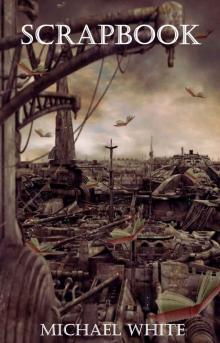 Scrapbook
Scrapbook Bob the Balloon, Al Capone and the Two Bob Bouncer
Bob the Balloon, Al Capone and the Two Bob Bouncer The King of the Cogs
The King of the Cogs A Bad Case of Sigbins
A Bad Case of Sigbins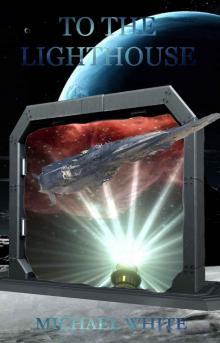 To the Lighthouse
To the Lighthouse Overboard!
Overboard!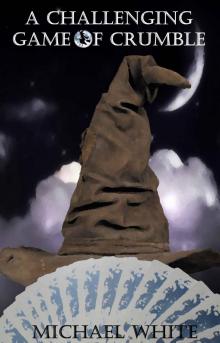 A Challenging Game of Crumble
A Challenging Game of Crumble Conversations With Isaac Newton
Conversations With Isaac Newton The Complete Adventures of Victoria Neaves & Romney
The Complete Adventures of Victoria Neaves & Romney Liverpool Revisited
Liverpool Revisited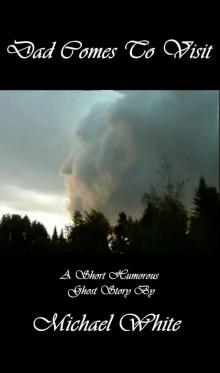 Dad Comes to Visit
Dad Comes to Visit Lachmi Bai, Rani of Jhansi: The Jeanne D'Arc of India
Lachmi Bai, Rani of Jhansi: The Jeanne D'Arc of India Barf the Barbarian in Red Nail (The Chronicles of Barf the Barbarian Book 2)
Barf the Barbarian in Red Nail (The Chronicles of Barf the Barbarian Book 2) Equinox
Equinox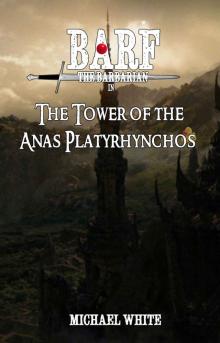 Barf the Barbarian in The Tower of the Anas Platyrhynchos (The Chronicles of Barf the Barbarian Book 1)
Barf the Barbarian in The Tower of the Anas Platyrhynchos (The Chronicles of Barf the Barbarian Book 1) The Medici secret
The Medici secret Jack Pendragon - 02 - Borgia Ring
Jack Pendragon - 02 - Borgia Ring The Art of Murder jp-3
The Art of Murder jp-3 Travels in Vermeer
Travels in Vermeer